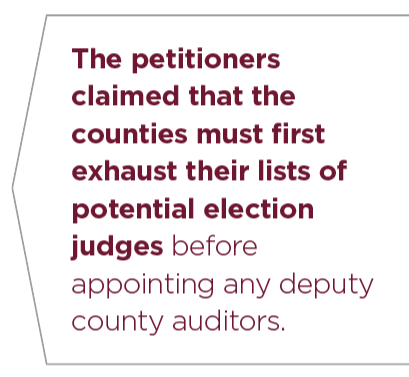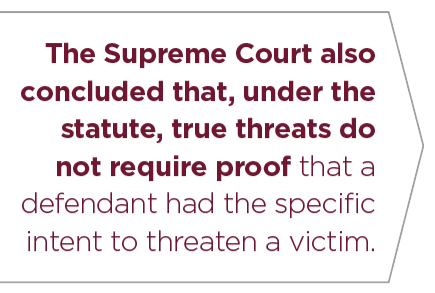US Supreme Court Upholds Censure of College Board Member
CONSTITUTIONAL LAW
Censure of elected official
The Houston Community College System in Texas is run by a board of nine trustees. The public elects the trustees to six-year terms without pay. David Wilson was elected to the board in 2013. Starting in 2017, Wilson criticized the other trustees, claiming they had violated the board’s bylaws and ethics rules, and making various other criticisms. As a result, the board publicly censured Wilson. Wilson sued, claiming the censure violated his right to free speech under the First Amendment to the U.S. Constitution.
 The district court ruled against Wilson, but the 5th U.S. Circuit Court of Appeals reversed the district court’s decision. The Court of Appeals concluded that the First Amendment precludes elected public boards from censuring members for their speech. The U.S. Supreme Court reversed the Court of Appeals’ decision and ruled against Wilson, concluding that a purely verbal censure does not give rise to a First Amendment claim.
The district court ruled against Wilson, but the 5th U.S. Circuit Court of Appeals reversed the district court’s decision. The Court of Appeals concluded that the First Amendment precludes elected public boards from censuring members for their speech. The U.S. Supreme Court reversed the Court of Appeals’ decision and ruled against Wilson, concluding that a purely verbal censure does not give rise to a First Amendment claim.
The Supreme Court noted that the First Amendment prohibits laws “abridging the freedom of speech,” which includes a prohibition on “retaliatory actions” for engaging in protected speech. The Supreme Court also noted, however, that elected bodies have long exercised the power to censure their members, and that a mere censure does not violate the First Amendment.
Houston Community College System v. Wilson, 142 S. Ct. 1253 (2022).
ELECTION LAW
Absentee ballot boards
The governing bodies of Ramsey County and Olmstead County established absentee ballot boards for the November 2020 general election. The counties appointed to these boards both election judges and county staff who were trained to process and count absentee ballots. The county staff were appointed under Minnesota Statutes, section 203B.121, which authorizes the appointment of “deputy county auditors.”
 The Minnesota Voters Alliance, the Republican Party of Minnesota, and several individuals (collectively, the petitioners) filed petitions with the district court requesting writs of mandamus (court orders requiring officials to execute a mandatory legal duty). The petitions claimed that the counties’ method of establishing the absentee ballot boards violated election law in several ways. The petitioners claimed that the counties must first exhaust their lists of potential election judges before appointing any deputy county auditors.
The Minnesota Voters Alliance, the Republican Party of Minnesota, and several individuals (collectively, the petitioners) filed petitions with the district court requesting writs of mandamus (court orders requiring officials to execute a mandatory legal duty). The petitions claimed that the counties’ method of establishing the absentee ballot boards violated election law in several ways. The petitioners claimed that the counties must first exhaust their lists of potential election judges before appointing any deputy county auditors.
The petitioners also claimed that the appointed staff were not “bona fide” deputy county auditors because they did not have authority to perform all the tasks that a county auditor could perform. In addition, the petitioners claimed that the deputy county auditors were required to disclose their party affiliation or non-affiliation, like election judges must do.
The district court ruled against the petitioners and denied their requested relief. The Minnesota Court of Appeals affirmed the district court’s decision. The Minnesota Supreme Court affirmed the Court of Appeals’ decision and ruled that the petitioners had failed to establish that the county officials had violated any mandatory duties that are clearly established by law. The Supreme Court noted that the statute does not require counties to follow the same procedure for appointing election judges when they appoint deputy county auditors. The Supreme Court also noted that the statute does not restrict membership on an absentee ballot board to a limited group of “bona fide” deputy county auditors or require deputies to disclose their party affiliation.
Minnesota Voters Alliance v. County of Ramsey, 971 N.W.2d 269 (Minn. 2022).
CONSTITUTIONAL LAW
Threats of violence statute
Chris Mrozinski was found guilty of violating the threats of violence statute, Minnesota Statutes, section 609.713, after she slid an envelope under the door of the St. Louis County Children Protection Services. She had handwritten “MISS ME YET?” on the envelope, which contained a threatening letter and four toe tags, like ones used to identify bodies in a morgue.
 Each of the tags contained the handwritten name of a different person associated with Mrozinski’s child protection matter that had resulted in her losing custody of her children. Each tag also included a handwritten address for “place of death,” a date for “date of birth,” “TBD” for “date of death,” and insulting names in the other spaces.
Each of the tags contained the handwritten name of a different person associated with Mrozinski’s child protection matter that had resulted in her losing custody of her children. Each tag also included a handwritten address for “place of death,” a date for “date of birth,” “TBD” for “date of death,” and insulting names in the other spaces.
Mrozinski appealed the district court’s denial of her motion to dismiss the charges, based on her claim that the statute was unconstitutional on its face because it is an overbroad restriction that could apply to constitutionally protected forms of speech. The Minnesota Court of Appeals affirmed the district court’s decision. The Minnesota Supreme Court affirmed the Court of Appeals’ decision and ruled that the statute is constitutional because it only punishes “true threats,” a category of speech that the First Amendment does not protect.
The Supreme Court also concluded that, under the statute, true threats do not require proof that a defendant had the specific intent to threaten a victim. Instead, true threats can exist when a defendant makes a violent communication recklessly.
State v. Mrozinski, 971 N.W.2d 233 (Minn. 2022).
MARKETABLE TITLE ACT
Public easements
Timothy Moratzka represents a trust that currently owns property including a disputed 30-foot-wide strip of land abutting Trout Lake in Itasca County. The county claimed that the public could use this strip of land, which is essentially a beach, because in 1911- 1912, a former owner of the property had dedicated it to public use forever through a recorded plat as authorized under state law.
 Moratzka brought a lawsuit to register the property’s title (clarify its ownership and any restrictions on its use) and argued that any public interest in the disputed land had been abandoned under the provisions of the state Marketable Title Act (MTA). The act generally provides that no property interest can “be asserted against a claim of title based on a source of title unless the interest is preserved by filing a notice within 40 years of the creation of the interest.”
Moratzka brought a lawsuit to register the property’s title (clarify its ownership and any restrictions on its use) and argued that any public interest in the disputed land had been abandoned under the provisions of the state Marketable Title Act (MTA). The act generally provides that no property interest can “be asserted against a claim of title based on a source of title unless the interest is preserved by filing a notice within 40 years of the creation of the interest.”
The district court ruled in Moratzka’s favor, concluding that the public easement was abandoned under the MTA because the interest was not recorded within 40 years after its dedication. The Minnesota Court of Appeals affirmed the district court’s decision and ruled that the MTA applies to land dedicated by plat to public use and extinguishes any public interest that is not properly recorded under the MTA.
The Court of Appeals reasoned that the MTA requires a claimant to accept an interest by recording in the office of county recorder “a notice sworn to by the claimant or the claimant’s agent or attorney” identifying the interest, the transaction upon which the interest is founded, and a description of the property.
In the Matter of the Application of Timothy D. Moratzka, N.W.2d (Minn. Ct. App. 2022). Note: The county will file a petition requesting the Minnesota Supreme Court to review the Court of Appeals’ decision.
RENTAL HOUSING ORDINANCE
Constitutional claims
After the City of Minneapolis adopted an ordinance regulating rental housing, the owners and managers of multi-unit residential buildings sued, raising takings and substantive due process claims under the U.S. Constitution and Minnesota Constitution. The ordinance requires landlords to evaluate applicants for rental housing by either: (1) “inclusive screening criteria,” or (2) “individualized assessment.”
Under the first option, applicants may not be rejected due to specifically listed criminal, credit, or rental history. Under the second option, applicants may be rejected for these or other lawful reasons. However, the landlord must “accept and consider all supplemental evidence provided with a completed application to explain, justify, or negate the relevance of potentially negative information revealed by screening.” The landlord must also notify the applicant in writing, specifying the basis for denial and explaining why supplemental evidence “did not adequately compensate for the factors that informed the landlord’s decision.”
The federal district court denied the plaintiffs’ motion for a preliminary injunction (order prohibiting the ordinance’s enforcement). The 8th U.S. Circuit Court of Appeals affirmed the district court’s decision. The Court of Appeals noted that the plaintiffs were not likely to succeed on the merits of their claims.
The Court of Appeals also noted that the legal analysis for a regulatory taking, rather than for a taking by physical invasion, was applicable because the ordinance restricted property use, but it did not amount to a physical invasion of property by the government. The Court of Appeals also concluded that the ordinance does not infringe on any right of the landlords to exclude others from their property; instead, it requires landlords to follow tenant screening procedures before others may be excluded.
301, 712, 2103, & 3151 LLC v. City of Minneapolis, 27 F.4th 1377 (8th Cir. 2022).
Written by Susan Naughton, research attorney with the League of Minnesota Cities. Contact: snaughto@lmc.org or (651) 281-1232.

